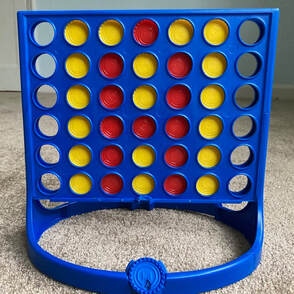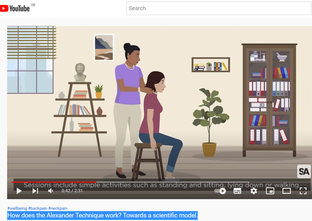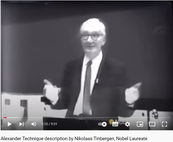
* Cliff Richard
**ONS
Photo by Ethan Robertson on Unsplash
 School's out and holiday season is upon us! If - like a reported 2.9 million people** in the UK - you suffer from back and neck pain, a change of scene could be just what you need. However don’t underestimate the effects of stress and rushing in the course of travelling to your holiday destination. Avoid putting your mind or your body (they are inseparably linked) under strain. Allow plenty of time to get to the airport or ferry. Choose a rucksack rather than a shoulder bag; a wheelie suitcase rather than a holdall. Take your time lifting your cabin bag up to and down from the overhead locker, or retrieving your case from the carousel. Oh, and leave your work devices behind. It’s hard to look your ‘beach body best’ with tech neck. * Cliff Richard **ONS Photo by Ethan Robertson on Unsplash  There are many reasons to love the Royal College of Music. These include:
Sounds good!  In recent weeks there has been a healthy explosion of writing and broadcasting about neurodiversity in general and autism in particular. I'm looking at you, Fern Brady! And tonight I will be watching the second documentary in Chris Packham's riveting BBC2 series 'Inside Our Autistic Minds'. In my Alexander Technique teaching too there has been an increase in young students (age 15-21) who have an autism spectrum diagnosis. In each case, they have come because of 'posture-related' pain issues linked to their hypermobility - hypermobility being a recognised co-occurrence of autism. The surprise has been that the Alexander Technique has not only helped in this regard but has also helped them to - in the words of one parent - "think in a different way".  Further to my previous post, here's another look at the Alexander Technique through a science lens: a short animated video commissioned by the F M Alexander Trust. Only 2 minutes long, this super little film draws on recent research (cited at the end of the video) to introduce the AT and its benefits. To watch it, click here.  The announcement today of this year's winner of the Nobel prize for physiology or medicine (well done Svante Paabo!) has brought to mind Nikolaas Tinbergen, the Dutch scientist who won the same prize almost 50 years ago. Tinbergen is revered in the Alexander community for the very eloquent and public recognition he gave to our work: so impressed was he with "the achievements of F M Alexander and his pupils" that he devoted almost ten minutes of his 1973 Nobel lecture to the Alexander Technique. He describes Alexander as "a very remarkable man" and his "discoveries concerning the organization and elicitation of individual and social behavioural patterns" as "one of the true epics of medical research practice". You can watch a recording of Tinbergen's description of the Alexander Technique here - highly recommended!  Tonight the final episode of ‘Freeze the Fear with Wim Hof’ airs on BBC1. I’ve enjoyed watching the Dutch “Iceman” train a likeable bunch of celebrities to rise to one freezing challenge after another, in a scenic but perishingly cold location somewhere in the Italian Alps. It may seem a far cry from the Alexander Technique, which tends to be taught in a warm, dry teaching room. But both involve the mastery of one’s response to a stimulus (which F M Alexander called “Inhibiting” and “the control of reaction”). In episode 1 of ‘Freeze the Fear’ we see the celebrities tense up as they face the prospect of a jump into a hole in the ice, shrieking and squealing as their bodies hit the icy water. By the end of the series, they have learned to control their breathing and their thinking in order to stay calm and centred. Both the AT and the Wim Hof method help reconnect us to ourselves, to others and to the world around us. The ambient temperature, however, is very different.
 A friend in her early sixties has had five falls in the past four months. “I clearly don’t know where my body ends and starts as I also often end up misjudging and punching the cupboard when reaching for something or walk into the door frame. Clearly some of it is doing two things at once and rushing. Do you think the Alexander Technique would help with this?” My answer to her was YES! The AT will:
Furthermore you will develop an ‘upward orientation’ so that if you do stumble, you are more likely to release out of it rather than hit the ground. I added the following proviso: like the proverbial light bulb in the old “How many therapists does it take to change a light bulb?” riddle**, you have got to want to change. *Harry Styles ** Q: How many therapists does it take to change a light bulb? A: Just one, but the lightbulb has to really want to change  Alexander Technique Music Conference 2021 If you are a musician, you will be pleased to know that a wonderful new resource has become available online to help you find comfort, balance and freedom in your playing and/or singing. It's available FREE on the Alexander Technique Music Conference 2021 YouTube channel. Alexander Technique specialists at UK conservatoires and elsewhere have contributed to a series of short videos, providing practical support for musicians at all levels and covering a wide range of instruments. Click here to take a look. Hearty congratulations to my colleagues Judith Kleinman, Catherine Fleming and Henry Fagg for curating such a valuable resource. *Daft Punk Photo by Luwadlin Bosman on Unsplash  How easily do you get up from a chair? New research published in The BMJ, and reported in The Times today, suggests that slower chair risers at the age of 65 are associated with a 14% greater risk of mortality over the next 10 years. My worry is that some people will read this statistic and conclude, "I must try to get up more quickly". But rushing to rise from a chair is likely to lead to an increase in effort and strain, when in fact the goal should be to move with greater lightness and co-ordination - exactly the qualities encouraged by the Alexander Technique, and undermined by hurrying. Unfortunately speed is simpler to monitor than ease, which is why researchers tend to favour it as a measure of functioning. Research led by Professor Archana Singh-Manou, University of Paris Photo by Mitch Moondae on Unsplash  The clematis flowers around the entrance to my teaching studio have opened out spectacularly this year - welcoming back AT students to in person lessons after months on Zoom. Given that the Alexander Technique is famously 'hands on', it has been a revelation to discover that it CAN be taught online. The general consensus though is that, while virtual AT lessons are better than nothing, they are not as good as 'the real thing'. To welcome newcomers to the Alexander Technique, I am offering a special introductory promotion throughout June: your first two lessons for the price of one! |
AuthorCarolyn Simon Archives
July 2024
Categories |
